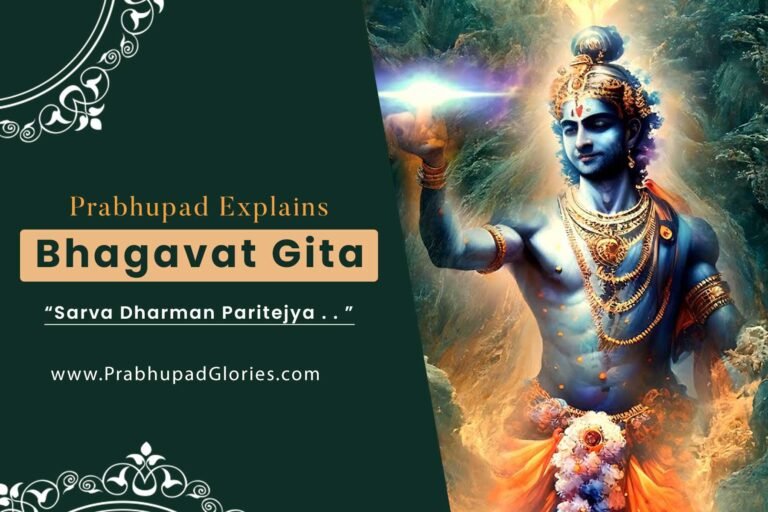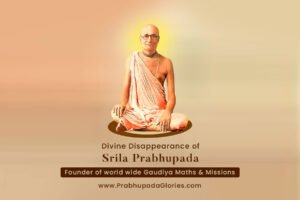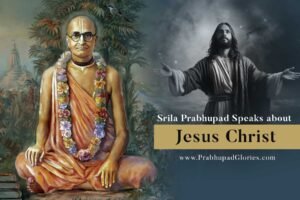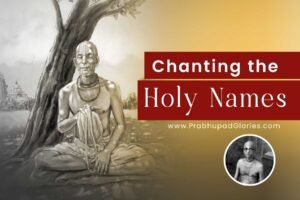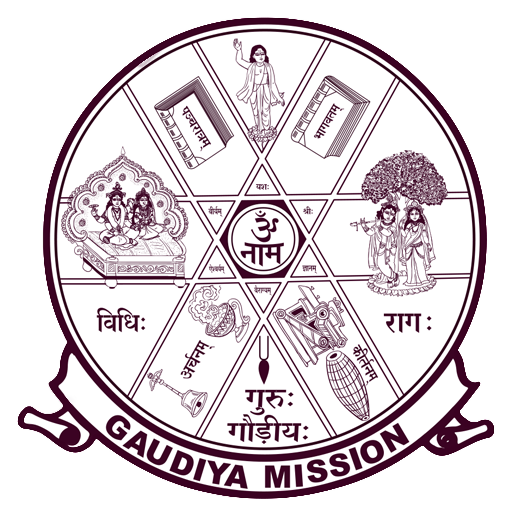Sarva Dharman Paritejya Mam Ekam Saranam Vraja
Question: Kindly explain the purport of the verse from Śrīmad Bhagavad-gītā beginning sarva-dharmān parityajya mām ekaṁ śaraṇaṁ vraja.
Srila Prabhupad Bhaktisiddhanta Saraswati Thakura :
The constitutional nature of the jīva, or living being, is that of a servant of the Supreme Lord Śrī Kṛṣṇa, and Śrī Kṛṣṇa is the eternal master of the living being. Only service to Śrī Kṛṣṇa is the living being’s eternal dharma. We are not the body; we are dehi, the embodied principal, the atomic conscious soul. This is the verdict of the scriptures.
Yet, having forgotten these facts, we consider the body and mind to be our self. From that point alone, all of our difficulties and confusion arise. Next, we consider the country of our body’s birth to be ‘my country’, and the lineage of our body’s birth to be ‘my family’. We then identify ourselves as a brāhmaṇa, kṣatriya, vaiśya, śūdra, mleccha, man, woman and so forth.
Again, with reference to the gradual change in the condition of the body, we consider ourselves to be a child, youthful or old. Identifying myself with my body, I also maintain the ego of being Indian, Bengali, or British, or I consider myself Hindu, Muslim, Marwari, Punjabi, or Bihari, etc. And with regard to āśrama, we consider ourselves a brahmacarī, gṛhastha, vānaprastha, or sannyāsī. You see, it is only when we are subject to these designations that we imagine, fabricate, or otherwise allow a variety of dharmas apart from our own true dharma to make their entrance.
The Supreme Lord is the speaker of the Gītā. He has said that the soul is eternal and unchangeable, while the body is temporary and prone to growth and deterioration. Those who consider that the unchangeable soul also undergoes changes like birth and death as the body does are foolish. Therefore, the term sarva dharma denotes all such designated dharmas that have originated because of identifying the body or mind to be oneself. In other words, these include dharma based on one’s varṇa – brāhmaṇa, kṣatriya, vaiśya, śūdra or even antyaja (outcaste), and so forth; dharma based on one’s āśrama – brahmacarī, gṛhastha, vānaprastha or sannyāsa; dharma based on worldly sense gratification or renouncing it; dharma related to the next world; and in fact all dharmas existing within this universe composed of fourteen planetary systems, apart from kṛṣṇa-seva or kṛṣṇa-āśraya.
The most benevolent Supreme Lord has mercifully told us that one should abandon the temporary dharma of the body and mind. Not only is that dharma to be given up (tyāga), but it is to be thoroughly abandoned (parityāga). In other words, forgetting even a memory of your body and mind, relinquish your material identity, and engage in the eternal dharma of the eternal soul, namely service to the Supreme Soul, Bhagavān.
But this simple truth cannot be suddenly accepted by the illusioned souls, and the evidence is the very next statement the Lord makes: “ahaṁ tvāṁ sarva-pāpebhyo mokṣayiṣyāmi”. The jīva is lamenting that if he gives up all temporary dharma related to the material body and mind and accepts his eternal dharma, he will incur sin. That material aspect [the body] will desert us, leave us, and perish despite our wishes, yet, due to past material attachments or due to delusion, we think that deserting the temporary dharmas related to that perishable body shall be sinful.
Alas, Alas! In neglecting his eternal dharma the conditioned soul incurs the greatest sin and the biggest offense, yet he is indifferent toward that. He considers temporary dharma to be eternal and is worried about the sins incurred by abandoning it. Not only does he consider it sinful, he is mournful. Therefore the Lord says mā śucaḥ – do not mourn.
Bhagavān Śrī Kṛṣṇa personally came and gave us so much instruction about Bhagavad-bhajan, but do we listen to His words? Do we follow His instructions and directions? If we do not listen to the instructions of Bhagavān; if we do not follow the scriptures and instead just nurture our own whims; if we consider our true duties to be optional duties and our optional duties to be obligatory; if we dishonor the statements of sādhu and guru and follow our own whims by fabricating our dharma ourselves, then who is to blame?

